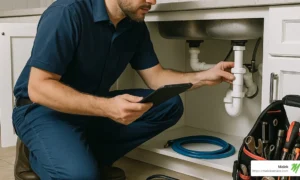When it comes to plumbing, there are some important distinctions between commercial and residential applications. Understanding the differences between commercial and residential plumbing can help you make an informed decision when choosing the best plumber in Melbourne for your project.
This blog will look at seven key differences between these two types of plumbing. But before we get into that, let’s understand the meaning of commercial and residential plumbing in detail. So, let’s begin.
What are Residential Plumbing and Commercial Plumbing?
Residential plumbing is replacing, repairing and installing pipes and fixtures for homes. This includes everything from water supply to drainage and plumbing for indoor fixtures such as toilets and sinks and outdoor fixtures such as faucets and irrigation systems. You may need to call a residential plumber if you have any issues with your residential plumbing or questions about how it works.
On the other hand, commercial plumbing is installing, maintaining, and repairing plumbing systems for commercial buildings. Commercial plumbing is used in many facilities, including schools, hospitals, factories, offices, hotels, shopping malls and restaurants. If you are planning on constructing a commercial building or remodelling one, you should hire an experienced commercial plumber to ensure that your project meets all environmental codes and requirements.
Key Differences between Residential and Commercial Plumbing
Commercial and residential plumbing systems have a lot in common. They both have the same basic components and work in the same way, but several key differences distinguish commercial plumbing from residential plumbing.
#1. Size of the Project
Commercial projects tend to be larger in scale than their residential counterparts. These projects can range from a few hundred square feet to several thousand square feet, whereas residential projects can be as small as one or two rooms or as large as an entire house. Commercial plumbers must have the experience, expertise, and resources necessary to handle large-scale jobs without sacrificing quality or efficiency.
#2. Complexity of the Project
The complexity of the project is also different when it comes to commercial and residential plumbing. Residential plumbing projects are often simpler than commercial projects because there are fewer regulations and guidelines for residential installations. On the other hand, commercial installations require a lot of planning since they involve multiple systems that need to be interconnected in order to function properly. As such, commercial plumbers must thoroughly understand all systems involved to ensure everything is properly installed and functioning correctly.
#3. Code Requirements
Commercial buildings require different codes than residential buildings when installing plumbing systems. It is due to the project’s complexity and the potential for greater liability in terms of health and safety regulations. Commercial buildings can have more stringent requirements regarding the type of materials used in their piping systems and other amenities such as sprinklers, fire suppression systems, etc., which may be required by local building codes or municipal ordinances that govern public buildings. Commercial plumbers need to have a deep understanding of code requirements before beginning any project.
#4. Timeframe for Completion
Due to their size, complexity, and code requirements, commercial projects often take longer than their residential counterparts, sometimes by days or weeks, depending on the scope of work involved. In addition, these projects require more extensive and detailed planning and design than residential plumbing. This means that contractors must carefully plan to complete projects within deadlines set by clients or local authorities.
#5. Cost Involved
Commercial and residential plumbing are both costly to install; however, the amount of work involved in commercial plumbing projects is much more significant than that of residential plumbing. Since commercial projects tend to be larger in scale and involve more complex systems, they also typically involve higher costs than their residential counterparts; however, these costs can be offset by working with experienced contractors who understand how best to optimise resources while still meeting code requirements and deadlines set by clients or local authorities.
#6. Equipment Used
Since commercial plumbing is more advanced and complex than residential plumbing, the type of equipment used will also differ between these two settings. Commercial projects often involve specialised equipment that may not be available on smaller-scale residential jobs. As such, it is important for contractors working on commercial projects to ensure they have access to all necessary equipment before beginning any work on-site.
#7. Certification Requirements
In addition to having extensive experience with large-scale construction projects and complex systems installation/repair work, most states require that plumbers working on commercial projects possess certain certifications related to this type of work (e.g., HVAC certification). It is important for contractors interested in taking on commercial jobs to verify licensing requirements before undertaking any project-related activities.
Final Takeaway
When considering a new plumbing project, whether a big or small job, homeowners and business owners need to understand the differences between commercial and residential plumbing so they can select the right contractor for their needs. Understanding these distinctions will help you make an informed decision when choosing your next plumbing contractor. With this knowledge, you can rest assured knowing you’re making an educated decision with your new construction project.
If you are looking for a reliable, expert, professional plumber in Melbourne (https://yourlocalplumbing.com.au/plumber-melbourne/ ), Your Local Plumbing is the name you can trust. They offer all sorts of plumbing services in residential and commercial settings. Their services include (but are not limited to) unclogging blocked drains, roof plumbing, gas installation, gutter replacement, backflow plumbing, and emergency plumbing in Melbourne.

































